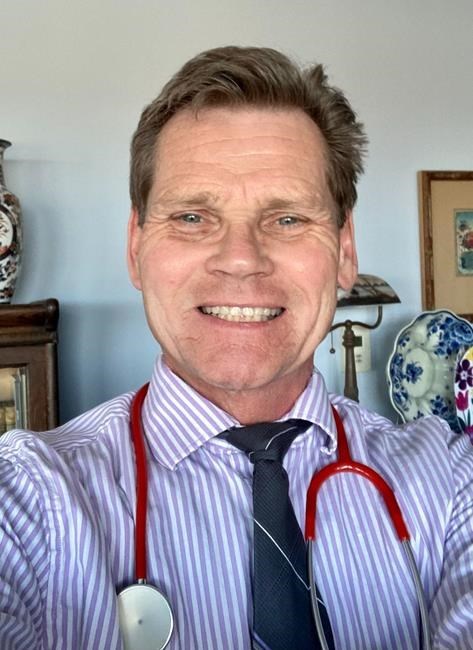HALIFAX — A Nova Scotia doctor of 43 years says the province’s shortage of family doctors is an issue decades in the making — made more acute by an aging population.
Dr. George Burden was “at the tender age of 23” when he fell in love with family medicine, but he says he’s not surprised that the province is struggling to find enough primary care doctors.
“Family practice is the best, you get to build such good relationships when you’re in an area for some time," he said in a recent interview. "People almost consider you part of the family."
The dynamics of family medicine have changed significantly over his career because of the rise in the average age of patients, Burden said.
“Back 40 years ago, about one patient in 20 was over 65, so my patient encounters were quicker with far less paperwork," Burden said. "As people get older, there are much more complex things going on."
According to a 2021 Statistics Canada report, there are nearly 216,000 Nova Scotians 65 and older, representing more than 21 per cent of the population.
“This group takes up most of my time, leaving little availability for acute issues, which often end up in the ER, clogging up (ER doctors') ability to deal with more serious emergencies,” he said.
Burden cares for about 2,000 patients in Elmsdale, a village in central Nova Scotia, where he’s been practising for his entire career. Late last month, Burden was struck by a car at a crosswalk, which he said gave him “a wake-up call” and pushed him toward retirement.
“I was lying on the ground looking up from the underside of the car, with a tire about a foot from my head, and I kind of had a revelation,” he said, adding that he hopes to spend more time with family and his grandson overseas.
He also suffered injuries to his wrist and thumb in the accident, which he said made work more challenging and contributed to his decision to retire this winter.
Burden says he’ll retire at the end of January, and he has told his patients to join the province’s Need a Family Practice registry, where more than 105,000 Nova Scotians were registered as needing a primary care physician as of Aug. 1.
The doctor said Nova Scotia’s current shortage of physicians can be traced back to the 1991 national Barer-Stoddart report, which was commissioned by the federal government. The report said there were too many doctors graduating from medical school in Canada and it recommended reducing enrolment and lowering the ratio of physicians to patients.
“A lot of governments grabbed onto it as an excuse to basically get rid of a lot of doctors, which they did by cutting medical school enrolments, which usually shows its effect about 10 years later,” Burden said.
Around the same time the Barer-Stoddart report came out, Nova Scotia froze physician fees, Burden said, which “meant about a 30 per cent cut in pay all of a sudden.” That decision led to many of Burden’s colleagues leaving the province, he said, adding that some went to the United States and to other provinces.
Burden doesn’t have anyone ready to take over his practice, though not for lack of trying. In 2020, Burden said, he began mentoring a doctor who was working on certifying her international medical training to practise in Nova Scotia. He had hoped to work with her for a year or so before she took over his patients.
“But she is still no closer to getting approval two years later,” he said.
Burden said he would like to see the province speed up the process for doctor licensing and certification in Nova Scotia.
But he is encouraged by the province’s progress in supporting collaborative-care clinics like his and by the new rural doctor medical school seats Nova Scotia announced in May. That program established five new medical school seats for students who will agree to work in a rural family practice for five years after graduation.
“You’ll get them in with the community, and it’ll happen with them as it happened with me, which is they’ll fall in love with the community and maybe they’ll keep the practice going,” he said.
"There's not anything that I would have traded it for because of the wonderful relationship I've had with my patients over the years."
This report by The Canadian Press was first published Aug. 23, 2022.
---
This story was produced with the financial assistance of the Meta and Canadian Press News Fellowship.
Lyndsay Armstrong, The Canadian Press




